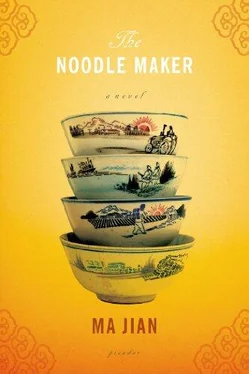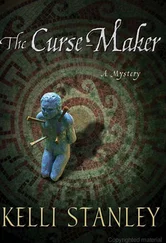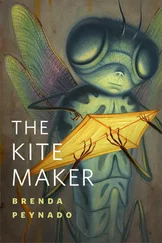(The writer remembers the blank expression on the painter’s face when he recounted his story in the cafeteria. It was impossible to know whether he was telling the truth or not. Perhaps the survivor was just an extension of himself. When the writer asked him if he really believed the dog had lived on that terrace, the painter grunted impatiently and said, ‘His kennel is still up there. You saw it yourself.’)
When I returned from the conference, I found the dog had been taken from my terrace and placed in the museum workshop. I heard that he would be travelling to Beijing the following month to take part in a national exhibition. When I first paid him a visit in the carpenter’s workshop, his coat seemed softer and shinier than it was when he was alive. His sad-looking eyes had been replaced by a pair of shiny glass balls. His ears used to droop, but now that they had dried, they stood up perkily on end. The carpenter had stuffed so much cotton wool into his stomach, he looked like a pregnant bitch. Around him lay piles of dead animals waiting to be stuffed. A leopard with glass eyes leaned against the wall, its four limbs still nailed to a wooden frame; a gutted fox waiting to be put outside to dry in the sun stared sadly out of the open window. Compared to the dismembered and lacerated pheasants, bald eagles and pythons by his side, the survivor looked very animated. But however hard I tried, I could never associate the dead survivor with the dog I had known.
My roof terrace is huge. When you stand by the edge, you can see the whole town spread out below. The survivor could spy on every home in every street. In over two years, he never once left the roof: that’s to say, he lived his entire life in mid-air. He kept his distance from the rest of humanity and refused to enter their world. While three thousand dogs perished at the hands of the town’s extermination brigade, he was able to survive two years up there, thanks to me and the distance he kept from the crowds. He often saw his fellow dogs being chased and battered by the authorities, and it upset him. But I must admit that on seven occasions I was tempted to hand him over to the police, as I knew this might improve my chances of being awarded Party membership. By looking after him, I sometimes felt I was bringing disgrace upon the Party. He often spouted reactionary ideas that would later trouble my mind during the political study classes at work.
He matured a great deal during his two years with me, and learned a few elegant turns of phrase. He developed a deep insight into all things that had happened and had not yet happened. His shiny black coat and droopy ears gave him the look of a foreign lawyer. His unusual bald head and long grey whiskers added to this air of a wise elder. He secretly saw himself as a holy messenger and prophet. He was optimistic about China’s implementation of the Open Door Policy, and agreed with the authorities that exhibitions of nude paintings weren’t in tune with the social climate of our country. When the Central Committee announced that they’d given a Chinese woman their personal consent to marry a French citizen, he praised their courage. He argued that the Responsibility System could save socialism, and applauded the government’s moves to encourage foreign companies to invest in our country. I asked him whether this policy would be tantamount to allowing foreign capitalists to take over the Chinese economy, but he just laughed at me coldly. I admit I grew very fond of him. Every day I brought back delicious things for him to eat and drink. I lost hours of sleep, worrying that one day the police would find him and take him away. My attachment to him was so deep that I managed to sit through my girlfriend’s suicide performance without shedding a tear.
Our conversations were fascinating. He told me stories from the Greek legends and fables from the Bible. His topics ranged from the ancient world to the modern, from China to the West. His imagination was boundless. It was a pleasure to spend my evenings with him. A few days before we witnessed the gang rape that took place on the streets below us, I asked him what changes dogs would make if they were placed in control of this town. He said: ‘First and foremost, we would eliminate the dog extermination brigade. Dogs are not to blame for rabies — we are just the innocent carriers of the virus. The dogs of this town would be granted the same privileges that dogs in foreign countries enjoy: they would be issued with dog collars made of real leather, and warm woollen dog coats. We would encourage humans to follow our example and restrict themselves to mating seasons, so as to improve the quality of their species. We would protect your borders, allow you freedom to travel, and freedom to set up opposition parties.’
His drooping ears flapped contentedly, and he continued: ‘Our dog government will send your politicians and generals to the countryside to produce high quality meat for us. Their salaries and status will be second only to ours. If I were the mayor of this town, I’d ban all political meetings and study sessions, and I’d urge people to walk on all fours, as modestly and unassumingly as us. I would also scrap the practice of blasting exercise music through the town every morning, so that people could have a lie-in if they wanted to.’
‘And what will our duties be in the new society?’
‘To serve the dogs,’ he said. ‘You will simply have to change your motto from “Serve the People” to “Serve the Dogs”. Your main responsibility will be to provide us with food and drink. As long as you don’t start wasting your time with useless political meetings, we will cause you no harm. Remember — a dog is a man’s best friend, and a man is a dog’s best partner.’
A few days later, as we looked down on the girl being raped in the streets below, the dog went back to this conversation and said, ‘But there’s one thing we’ll insist on when we come to power: we will ban all cars, trucks and bicycles from the town, to ensure that dogs are free to cross the roads when they wish.’
That day, the traffic in the streets below was blocked solid. At the intersection, a group of young men had pinned a girl to the ground and were raping her again and again. They had ripped all the clothes from her body and flung them in the air.
(‘Gang rapes are becoming a common sight in the cities and towns of China,’ the blood donor tells his friend. ‘In Shanghai last year, there was a gang rape that lasted two hours. The traffic in Nanjing Road came to a standstill. The crowd of spectators was so thick, the police were unable to reach the scene of the crime. When the girl managed to break free at last, she clambered up to the traffic warden’s watchtower and begged for help, but the warden refused to open his door for her. The boys then pulled her down and began to rape her all over again. I read that the girl later suffered a nervous breakdown. After the rapists were finally arrested, the ringleader was driven to a sports stadium and executed by a firing squad.’)
The girl below us finally managed to break free. She climbed up to the traffic warden’s watchtower to beg for help, but the warden refused to open his door. He said he was only responsible for the traffic. Before she had time to argue, one of her attackers pulled her down again and pressed her to the ground. From the terrace, he looked like a mechanical toy as he thrust himself in and out of her body. His partners stood around him in a circle, pushing the onlookers back.
‘They’ve brought the traffic to a stop,’ the survivor said. ‘When dogs mate, our friends don’t stand about gaping at us like that.’
‘This shouldn’t be happening!’ I shouted. ‘It’s a disgrace!’
A large crowd had gathered on the streets. People stared out from the windows of the surrounding apartment blocks. A mob stormed onto the pedestrian flyover above the intersection even though it hadn’t yet been officially opened to the public. In the scrum, a few people were squeezed over the edge and fell onto the crowd below. Time and again, the girl’s white bra could be seen flying into the air, then floating gently to the ground. Her red knickers were flung so high, they became caught on one of the lamps on the flyover. Two young men challenged each other to bring them down. As they climbed the flyover’s cement legs, the crowd burst into applause. The thinner of the two made it to the top first. He grabbed hold of the knickers, kissed them, then hurled them back down into the crowd. A man below caught them and tossed them into the air again. For a minute or so, they hovered above the crowd like a dove, before falling once more to the ground.
Читать дальше












